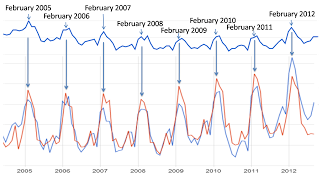Remote health, also known as telemedicine, is fast becoming a popular option to reach more patients in a shorter amount of time. According to iHeartBeat, 89% of healthcare executives said they expect telemedicine to transform the U.S. healthcare system in the next decade. Remote healthcare changes the way a doctor meets his/her patient. Instead of meeting one on one in a patient’s room, the doctor appears on a monitor to speak to the patient. All necessary health records are sent to the doctor electronically.
Hospitals Reap Benefits
Remote health, also known as telemedicine, is fast becoming a popular option to reach more patients in a shorter amount of time. According to iHeartBeat, 89% of healthcare executives said they expect telemedicine to transform the U.S. healthcare system in the next decade. Remote healthcare changes the way a doctor meets his/her patient. Instead of meeting one on one in a patient’s room, the doctor appears on a monitor to speak to the patient. All necessary health records are sent to the doctor electronically.
Hospitals Reap Benefits
According to Towers Watson, the percentage of healthcare employers offering telemedicine is expected to increase by 68% by next year, from 22% in 2014 to 37% in 2015. Any size hospital can benefit from using remote health. If a hospital has a shortage of physicians on site, the patient can be seen remotely by a specialist. Rural hospitals benefit the most that may not have certain specialists available most of the time or at all.
Patients Get Faster Care
Remote health can help patients with both minor and serious conditions.
Some areas that remote health are used in are for conditions like:
- Strokes
- Psychiatric Emergencies
- Heart Attacks
- Dental Care
- Women’s Health
Stroke Care
Diagnosing and treating patients with symptoms of stroke only have a small window to receive treatment, called TPA, in order to avert the long term effects of the stroke. If it is given in a short window of time, they may not have any effects of the stroke.
Psychiatric Care
In psychiatric cases where patients may be on the verge of self-harm, psychiatrists meet remotely to discuss symptoms, psychological and physical history. Remote care can reduce the amount of time a patient is in distress by using remote care to quickly diagnose their condition so that they can be brought to the psychiatric wing and given appropriate medication for their condition.
Heart Attack Care
Heart attacks, like strokes, have a small window of time for treatment. Both can be deadly if not treated immediately. A remote doctor may be more accessible if there is a very busy ER department with multiple injuries in need of treatment.
Dental Care
Although dental care doesn’t sound like something a remote doctor can help, it can speed up patient time in the dental chair. For example, a dental hygienist can take care of the routine cleaning and then process the patient’s dental insurance in Texas while the doctor, on screen from another state, can decide if more treatment is needed. The remote doctor can view the records, including x-rays, electronically and pass on the information to another dentist in the practice to handle procedures that are above and beyond what dental hygienists can do.
Women’s Health
Although it might seem odd for a doctor to examine a patient for women’s health issues, it will still have a similar outcome to other uses of remote health. Nurses can do the examinations. The records can be uploaded for the doctor to see and make a determination on further treatment or medication.
One fascinating aspect of remote care is that the treating doctor doesn’t even have to be in the same state as the patient. Doctors can have licenses to practice in multiple states. A patient in Oklahoma may be conversing with a doctor in New York. This is one of the reasons remote health is becoming so popular. With a shortage of doctors, especially specialists, having a doctor on call who is licensed in that patient’s state reduces the time it takes to be seen.
Remote health is changing the landscape of patient care. It is filling in gaps where there are not enough physicians or specialists to turn to.








